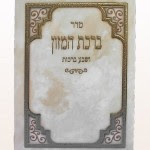
Just over a week ago we changed over from year-round to Pesach food and utensils, and now it’s time to change back.
The question is whether things will revert to exactly what they were before Pesach.
On one level the answer is probably no. People sometimes mislay something in all the domestic upheaval. Sometimes you keep out a Pesach utensil for use during the year.

On a deeper level the question is psychological.
Has our thinking, our whole being, reverted to what it was?
Let’s hope the answer is no. Pesach should have changed what we are and how we think of things and people.
The person I will be next week will hopefully be more tolerant, able to live with the wicked as well as the wise one, hoping that the son who once was unable to ask questions is now well on the way to being a fully involved member of the family and the Jewish people.

The climax of the 7th day haftarah is the same as the conclusion of the Grace After Meals – the verse, Magdil (or: migdol) yeshu’ot malko v’oseh chessed lim’shicho l’David ul’zar’o ad olam: “He magnifies (or: is a tower of) victory for His king and deals kindly with His anointed, with David and his descendants for ever.”
The haftarah version comes from II Samuel 22; the Grace After Meals version from Psalm 18. The psalm says magdil and the haftarah says migdol.
The psalm version seems better linguistically, since magdil as a verb is paralleled by the verb oseh in the second half of the verse, though it is not unknown for God to be called a tower, e.g. Psalm 61:4, where He is “a tower of strength”.
It is easy to blame the variants on scribal carelessness but Samson Raphael Hirsch says, “This psalm began in II Samuel, Chapter 22, as a part of the story of David. David himself made some changes in it when it was finally turned over to the people as a kind of national hymn”.
David turned verse 51 from history: “God is (or: was) my tower of support”, to a prayer or hope that He may in future support the Davidic dynasty, reflecting the natural ambition of a ruler to see his dynasty endure.
Our practice is to assign magdil to the Grace After Meals on weekdays and migdol to Sabbaths and festivals.
Baruch Halevi Epstein believes that though people tended to use magdil (the psalm version), the prayer books had a marginal note, bet-shin-bet migdol, i.e. “In II Samuel – biSh’mu’el Bet – migdol”, which was misread due to the use of abbreviations as b’Shabbat migdol – “On Sabbath (and festivals) migdol”.
Epstein argues that either version is acceptable and that there is no need to assign the alternatives to different occasions.
Why do we need to conclude Grace After Meals with this verse at all? Because of the practice of ending major prayers with a reference to the messianic redemption.